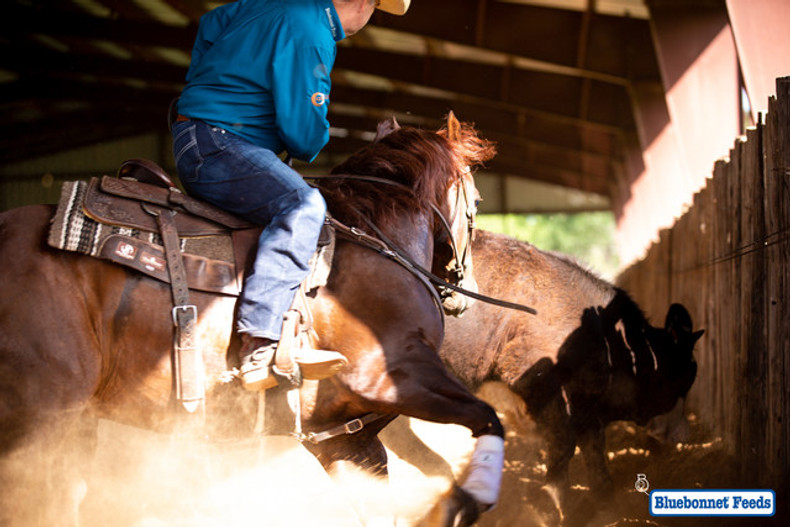With over 20 world titles in Cow Horse and Reining, Robert Chown knows a thing or two about getting a horse to perform at his best. It takes a great horse, excellent training, and a talented rider to help a horse excel, but Chown would argue there is a fourth component to consider. “In competition horses, or even pleasure horses, when you are trailering them [and training on them], you’re putting stress on them. When we think about horses under stress, we think about gut issues,” Chown explains.
Digestive health is finally getting the attention it deserves in horse communities. “The gut is like the second brain of a horse,” states Dr. Jyme Nichols, equine nutritionist for Bluebonnet Feeds, “if the microbial ecosystem is out of balance, it can have a significant impact on a horse’s mental state of mind, receptiveness to training, and response to rider cues.” The gut and the brain are connected by an information superhighway known as the vagus nerve. Bacteria within the gut can produce chemical signals which are then communicated back to the brain by the vagus nerve. This is one example of how bacteria or microflora within the gut have a direct influence on mood and mental state.
“I think anything we can do to combat stress in a horse is going to help”, states Chown, “when you are training here in North Texas, or wherever you are training a horse, you need that horse to have some endurance, but you don’t want a [mental] high.” The horse’s diet plays a large role in how level-headed a horse is. “Providing adequate nutrition from a feed that is high in cool-energy calories is one way to support the calorie needs of a performance horse without giving them a sugar rush or causing unwanted excitability,” adds Nichols. Sweet feeds, corn and oats are high in non-structural carbohydrates (NSC) which are quickly converted to glucose. This causes sugar spikes in the blood and can lead to hyper-reactivity in a horse. On top of that, high starch diets can lead to negative shifts in the microbial populations in the gut and predispose a horse to developing stomach ulcers.
For over 10 years, Chown has relied on Bluebonnet Feeds Intensify Omega Force and Horseman's Elite Pelleted to provide his horses with exactly what they need and avoid all the things they don’t. Between LIFELINE+ Equine (a plasma supplement that supports digestive health, joints, lungs, and immune health) and Intensify Omega Force, Chown and his family have been relying on these secret weapons to maximizes their horses’ potential. Plasma has been scientifically proven to prevent the formation of gastric ulcers which is a major concern for performance horses. Providing a daily plasma supplement, along with a low starch feed that is fortified with appropriate levels of prebiotics, probiotics, and digestive enzymes goes a long way to reducing stress and ensuring a healthy gut.

